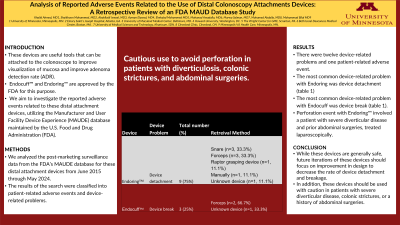Sunday Poster Session
Category: Colon
P0226 - Analysis of Reported Adverse Events Related to the Use of Distal Colonoscopy Attachments Devices: A Retrospective Review of an FDA MAUDE Database Study
Sunday, October 27, 2024
3:30 PM - 7:00 PM ET
Location: Exhibit Hall E

Has Audio

Khalid Ahmed, MD
University of Pennsylvania
minneapolis, MN
Presenting Author(s)
Khalid Ahmed, MD1, Shaikhoon Mohammed, MD2, Abdellatif Ismail, MD3, Ayman Elawad, MD4, Elmkdad E. Mohammed, MD5, Mohanad Awadalla, MD6, Marwa Salman, MBBS7, Mohammad Adam, MD, MSc8, Azizullah Beran, MD9, Mohamed Abdallah, MD10, Mohammad Bilal, MD11
1University of Pennsylvania, Philadelphia, PA; 2Macon Medical Group PC, Atlanta, GA; 3University of Maryland Medical Center, Baltimore, MD; 4Massachusetts General Hospital, Boston, MA; 5The Wright Center for Graduate Medical Education, Scranton, PA; 6Beth Israel Deaconess Medical Center, Boston, MA; 7University of Medical Sciences and Technology, Khartoum, Sudan, Philadelphia, PA; 8University of Missouri - Kansas City School of Medicine, Kansas City, MO; 9Indiana University School of Medicine, Indianapolis, IN; 10Cleveland Clinic, Cleveland, OH; 11University of Minnesota and Minneapolis VA Health Care System, Minneapolis, MN
Introduction: Distal attachment devices are useful tools that can be attached to the distal end of a colonoscope to improve visualization of mucosa during colonoscopy and can improve adenoma detection rate (ADR). Endocuff™ and Endoring™ are approved by the FDA for this purpose However, there is limited information regarding any adverse events (AE) with these devices. This study aims to investigate the reported adverse events and device failures related to these distal attachment devices, utilizing the Manufacturer and User Facility Device Experience (MAUDE) database maintained by the U.S. Food and Drug Administration (FDA).
Methods: We analyzed the post-marketing surveillance data from the FDA’s MAUDE database for these distal attachment devices from June 2015 through May 2024. The results of the search were classified into patient-related adverse events and device-related problems.
Results: A total of nineteen claims for these distal attachment devices were found, and six were duplicates, leaving a total thirteen for analysis. There were twelve device-related problems and one patient-related adverse event. Claims involved Endoring™ (n=10, 76.9%) and Endocuff™ (n=3, 23.1%). All device-related problems with Endoring™ were due to device detachments, and all detached devices were retrieved (n=9, 100%) (Table 1). The most common sites of detachment were the sigmoid colon (n=5, 55.6%), rectum (n=2, 22.2%), and unspecified (n=2, 22.2%). The primary reasons for Endoring™ detachments were size mismatch between the device and colonoscope (n=4, 44.4%), ‘tight’ sigmoid colon (n=1, 11.1%), and unspecified (n=4, 44.4%). Regarding the Endocuff™ device, all device-related problems were reported as device breaks and all devices were retrieved (n=3, 100%). Two devices were retrieved by using forceps while the other used an unspecified device. An adverse event with Endoring™ involved a patient with severe diverticular disease and prior abdominal surgeries, who developed a perforation treated laparoscopically. The physician attributed the perforation to the patient’s severe diverticular condition and previous hysterectomy.
Discussion: While these devices are generally safe, future iterations of these devices should focus on improvement in design to decrease the rate of device detachment and breakage. In addition, these devices should be used with caution in patients with severe diverticular disease, colonic strictures, or a history of abdominal surgeries.
Note: The table for this abstract can be viewed in the ePoster Gallery section of the ACG 2024 ePoster Site or in The American Journal of Gastroenterology's abstract supplement issue, both of which will be available starting October 27, 2024.
Disclosures:
Khalid Ahmed, MD1, Shaikhoon Mohammed, MD2, Abdellatif Ismail, MD3, Ayman Elawad, MD4, Elmkdad E. Mohammed, MD5, Mohanad Awadalla, MD6, Marwa Salman, MBBS7, Mohammad Adam, MD, MSc8, Azizullah Beran, MD9, Mohamed Abdallah, MD10, Mohammad Bilal, MD11. P0226 - Analysis of Reported Adverse Events Related to the Use of Distal Colonoscopy Attachments Devices: A Retrospective Review of an FDA MAUDE Database Study, ACG 2024 Annual Scientific Meeting Abstracts. Philadelphia, PA: American College of Gastroenterology.
1University of Pennsylvania, Philadelphia, PA; 2Macon Medical Group PC, Atlanta, GA; 3University of Maryland Medical Center, Baltimore, MD; 4Massachusetts General Hospital, Boston, MA; 5The Wright Center for Graduate Medical Education, Scranton, PA; 6Beth Israel Deaconess Medical Center, Boston, MA; 7University of Medical Sciences and Technology, Khartoum, Sudan, Philadelphia, PA; 8University of Missouri - Kansas City School of Medicine, Kansas City, MO; 9Indiana University School of Medicine, Indianapolis, IN; 10Cleveland Clinic, Cleveland, OH; 11University of Minnesota and Minneapolis VA Health Care System, Minneapolis, MN
Introduction: Distal attachment devices are useful tools that can be attached to the distal end of a colonoscope to improve visualization of mucosa during colonoscopy and can improve adenoma detection rate (ADR). Endocuff™ and Endoring™ are approved by the FDA for this purpose However, there is limited information regarding any adverse events (AE) with these devices. This study aims to investigate the reported adverse events and device failures related to these distal attachment devices, utilizing the Manufacturer and User Facility Device Experience (MAUDE) database maintained by the U.S. Food and Drug Administration (FDA).
Methods: We analyzed the post-marketing surveillance data from the FDA’s MAUDE database for these distal attachment devices from June 2015 through May 2024. The results of the search were classified into patient-related adverse events and device-related problems.
Results: A total of nineteen claims for these distal attachment devices were found, and six were duplicates, leaving a total thirteen for analysis. There were twelve device-related problems and one patient-related adverse event. Claims involved Endoring™ (n=10, 76.9%) and Endocuff™ (n=3, 23.1%). All device-related problems with Endoring™ were due to device detachments, and all detached devices were retrieved (n=9, 100%) (Table 1). The most common sites of detachment were the sigmoid colon (n=5, 55.6%), rectum (n=2, 22.2%), and unspecified (n=2, 22.2%). The primary reasons for Endoring™ detachments were size mismatch between the device and colonoscope (n=4, 44.4%), ‘tight’ sigmoid colon (n=1, 11.1%), and unspecified (n=4, 44.4%). Regarding the Endocuff™ device, all device-related problems were reported as device breaks and all devices were retrieved (n=3, 100%). Two devices were retrieved by using forceps while the other used an unspecified device. An adverse event with Endoring™ involved a patient with severe diverticular disease and prior abdominal surgeries, who developed a perforation treated laparoscopically. The physician attributed the perforation to the patient’s severe diverticular condition and previous hysterectomy.
Discussion: While these devices are generally safe, future iterations of these devices should focus on improvement in design to decrease the rate of device detachment and breakage. In addition, these devices should be used with caution in patients with severe diverticular disease, colonic strictures, or a history of abdominal surgeries.
Note: The table for this abstract can be viewed in the ePoster Gallery section of the ACG 2024 ePoster Site or in The American Journal of Gastroenterology's abstract supplement issue, both of which will be available starting October 27, 2024.
Disclosures:
Khalid Ahmed indicated no relevant financial relationships.
Shaikhoon Mohammed indicated no relevant financial relationships.
Abdellatif Ismail indicated no relevant financial relationships.
Ayman Elawad indicated no relevant financial relationships.
Elmkdad Mohammed indicated no relevant financial relationships.
Mohanad Awadalla indicated no relevant financial relationships.
Marwa Salman indicated no relevant financial relationships.
Mohammad Adam indicated no relevant financial relationships.
Azizullah Beran indicated no relevant financial relationships.
Mohamed Abdallah indicated no relevant financial relationships.
Mohammad Bilal: Boston Scientific – Consultant. Cook endoscopy – Speakers Bureau.
Khalid Ahmed, MD1, Shaikhoon Mohammed, MD2, Abdellatif Ismail, MD3, Ayman Elawad, MD4, Elmkdad E. Mohammed, MD5, Mohanad Awadalla, MD6, Marwa Salman, MBBS7, Mohammad Adam, MD, MSc8, Azizullah Beran, MD9, Mohamed Abdallah, MD10, Mohammad Bilal, MD11. P0226 - Analysis of Reported Adverse Events Related to the Use of Distal Colonoscopy Attachments Devices: A Retrospective Review of an FDA MAUDE Database Study, ACG 2024 Annual Scientific Meeting Abstracts. Philadelphia, PA: American College of Gastroenterology.
